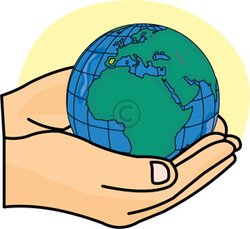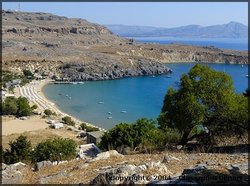Geography
|
|
Geography is the scientific study of the locational and spatial variation in both physical and human phenomena on Earth. Geography is the science that studies the lands, the features, the inhabitants, and the phenomena of the Earth. There are two main branches of Geography, human geography and physical geography. The word derives from the Greek words γη or γεια ("Earth") and γραφειν ("to write," as in "to describe").
Geographers not only investigate what is where on the Earth, but also why it's there and not somewhere else, sometimes referred to as "location in space." They study this whether the cause is natural or human and also the consequences of those differences.
Geography is much more than cartography, the study of maps, and is far beyond the study of 'capes and bays'.
| Contents |
History of geography
History of geography. The Greeks are the first known culture to actively explore geography as a science and philosophy. Mapping by the Romans as they explored new lands added new techniques. During the Middle Ages, Arabs such as Idrisi, Ibn Batutta, and Ibn Khaldun maintained the Greek and Roman techniques and developed new ones.

Over the past two centuries the quantity of knowledge and the number of tools has exploded. There are strong links between geography and the sciences of geology and botany, as well as economics, sociology and demographics.
Methods
Maps are key tools used to understand spatial interrelationships in this science. Classical cartography has been joined by the more modern approach to geographical analysis, computer-based geographic information systems (GIS).
Geographers use four interrelated approaches:
- Systematic - Groups geographical knowledge into categories that can be explored globally
- Regional - Examines systematic relationships between categories for a specific region or location on the planet.
- Descriptive - Simply specifies the locations of features and populations.
- Analytical - Asks why we find features and populations in a specific geographic area.
Geography Topics
Branches
Physical geography
This branch focuses on Geography as an Earth science, making use of biology to understand global flora and fauna patterns, and mathematics and physics to understand the motion of the earth and relationship with other bodies in the solar system. It also includes landscape ecology and environmental geography.
Sometimes Oceanography is included as a branch within physical geography, but is now considered a separate subject in its own right.
Human geography
Human geography is a branch of geography that focuses on the study of patterns and processes that shape the human society. It examines how humans adapt themselves to the land and to other people, and in macroscopic transformations they enact on the world. Human geography, including economic, political and cultural geography, focuses on the social science, non-physical aspects of the way the world is arranged.
Related Topics:
Geographic techniques
- Cartography studies the representation of the Earth's surface with abstract symbols. It can be said, without much controversy, that cartography is the seed from which the larger field of Geography grew. Most geographers will cite a childhood fascination with maps as an early sign they would end up in the field. Although other subdisciplines of geography rely on maps for presenting their analyses, the actual making of maps is abstract enough to be regarded separately.
Cartography has grown from a collection of drafting techniques into an actual science. Cartographers must learn cognitive psychology and ergonomics to understand which symbols convey information about the Earth most effectively, and behavioral psychology to induce the readers of their maps to act on the information. They must learn geodesy and fairly advanced mathematics to understand how the shape of the Earth affects the distortion of map symbols projected onto a flat surface for viewing.
- Geographic Information Systems deals with the storage of information about the Earth for automatic retrieval by a computer, in an accurate manner appropriate to the information's purpose. In addition to all of the other subdisciplines of geography, GIS specialists must understand computer science and database systems. GIS has so revolutionized the field of cartography that nearly all mapmaking is now done with the assistance of some form of GIS software.
- Geographic quantitative methods deal with numerical methods peculiar to (or at least most commonly found in) geography. In addition to spatial analyses, you are likely to find things like cluster analysis, discriminant analysis, and non-parametric statistical tests in geographic studies.
Geography Clipart and Pictures
- Geography Clipart (https://classroomclipart.com/image/category/geography-clipart.htm)
- Map Clipart (https://classroomclipart.com/image/category/maps-clipart.htms)
- Geography Pictures (https://classroomclipart.com/image/category/geography-photos.htm)
See also
- Human geography
- List of geography topics
- Geographical terms
- List of countries
- Geography reference tables
- Geopolitics
- Geographic magazines
- National Geographic Society
- National Geographic Bee
The World in Spatial Terms
Maps, Tools, Technologies Mental Maps
Places and Regions
Physical and Human Characteristics Regions Influence of Cultures
Physical Systems
Weathering, Erosin, Landforms Ecosystems and Climate
Human Systems
Human Migration Peoples way of life, inscriptions, handbills, signs Transporation and communication Human Settlements Conflict and InfluenceL
Environment and Society
the Earth into four spheres for the purpose of study and understanding: the lithosphere (solid rock), atmosphere (air), hydrosphere (water), and biosphere (life
interaction is how physical and ecological systems affect human beings and their activities Natural resources




